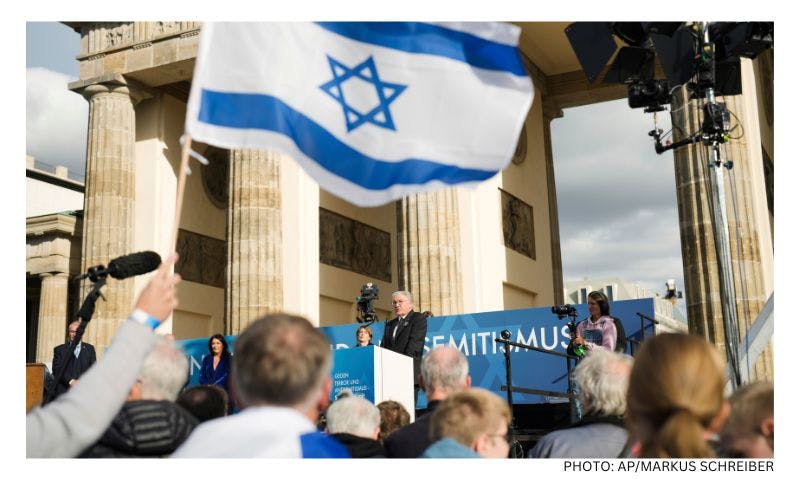Published: 1 October 2020
Last updated: 4 March 2024
IN NOVEMBER 1967, the passage of UN Security Council Resolution 242, following the Six-Day War, was accompanied by lively debate about language. For some UN members the resolution’s call for “withdrawal of Israel armed forces from territories occupied in the recent conflict” lacked two vital words. Should it not have been “all” territories, or “the” territories, ideally “all the” territories?
Fast forward 53 years and beneath the hoopla of the US/UAE/Israeli Abraham Accords, signed on September 15, also lurk questions of language and intent.
The joint statement issued by the three countries on August 31 said that the breakthrough in relations between the UAE and Israel (and subsequently Bahrain) resulted in “the suspension of Israel’s plans to extend its sovereignty” in the West Bank. The UAE’s ambassador in Washington, Yousef Al Otaiba, said the agreement “immediately stops annexation and … maintains the viability of a two-state solution”.
Yet at the same time, Netanyahu declared on Hebrew-language television that there had been “no change in my plans for annexation, with full co-ordination with the US”.
During an earlier media briefing in Washington, President Trump declared that “right now” annexation is “off the table. I can’t talk about some time in the future”. He then turned to David Friedman, the US ambassador to Israel (and an unabashed supporter of Israeli settlement activity), asking: “Is that a correct statement?”
“Yes,” Friedman replied, “the word ‘suspend’ was chosen carefully by all the parties. ‘Suspend,’ by definition, look it up, means temporary halt, it’s off the table now but it’s not off the table permanently.”
Trump’s senior adviser on the Middle East, Jared Kushner, offered more in this vein. Israel had agreed not to move forward without US approval. “We do not plan to give our consent for some time,” said Kushner. It was a discussion that would be had, though “not in the near future”. Asked about “temporary”, Kushner defined it, with Trumpian precision, as somewhere “between a long time and a short time”.
In early September, Reuters reported that differences in the English and Arabic versions of the August 31 joint statement had been “seized upon” by Palestinians to argue that the UAE had overstated Israel’s readiness to drop its annexation plans. According to Reuters, the English-language version of the text used “suspension”, while the Arabic language version talked of “Israel’s plans to annex Palestinian lands being stopped”.
A senior UAE official reportedly attributed the differences to a translation issue. The senior PLO figure, Hanan Ashrawi, countered that it was a “forked tongue” aimed at misleading Arab public opinion.
Whether annexation is truly dead or merely comatose, only time will tell. In the short term, two factors will decide its fate. The first is the outcome of the US presidential election. Democratic contender Joe Biden has made clear his opposition to annexation and declared he will reverse Trump administration actions “which I think significantly undercut the prospects of peace”.
The second factor involves Netanyahu’s legal troubles over allegations of corruption and whether he goes to jail. His trial is scheduled to start hearing evidence in January.
In mid-September, the Foreign Minister, Marise Payne, welcomed the normalisation of relations between Israel, the UAE and Bahrain and “Israel’s commitment to suspend plans for West Bank annexations”.
There are two things Australia should now do. The first is to use its close relationship with Israel to urge it to abandon annexation altogether. The second is to consider how it would respond to a re-elected Trump and a resuscitated drive for annexation.
There are two things Australia should now do.
The first is to use its close relationship with Israel to urge it to abandon annexation altogether, clearly and unequivocally. The second is to consider how it would respond to a perfect storm of a re-elected Trump, an at-large Netanyahu and a resuscitated drive for annexation.
This would demand more than the tardy and featherweight comment by Foreign Minister Payne on July 1 that Australia had “raised its concerns with Israel in relation to indications of annexations”.
Meaningful action could include marshalling an international effort to impose sanctions on Israel, as Australia did with Russia’s annexation of Crimea. One prompt and cost-free action would be to close Australia’s Trade and Defence Office in West Jerusalem.
Opened in March 2019 without fanfare and little real purpose, its stated aim is to complement Austrade’s work in Tel Aviv. Precisely how is unclear, given that Tel Aviv remains Israel’s trade and technology “capital” and headquarters of the Israeli defence establishment.
The perfect storm might not eventuate, sparing the government the awkwardness of taking issue with Israel. Still, the Prime Minister has declared that if need be Australia will “openly rebuke a sincere friend” on issues such as land appropriations and settlements. Australia should work to make “suspension” of annexation permanent. But is also needs a plan B.
READ MORE
Hamas: Friedman’s remarks about annexation exposes lies of Arab normalisers (Middle-East Monitor)
Hamas said US Ambassador to Israel David Friedman’s remarks that Tel Aviv’s plans to annex large swathes of the occupied West Bank have been “suspended not cancelled” exposes the lies of Arab states who have normalised ties with the occupation state
Image: Australia's Foreign Minister Marise Payne and an annexation map





